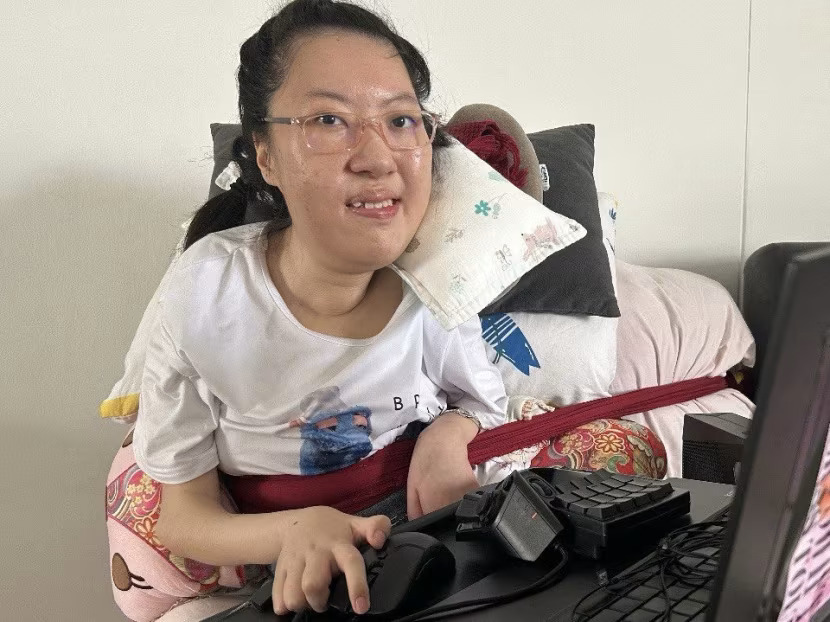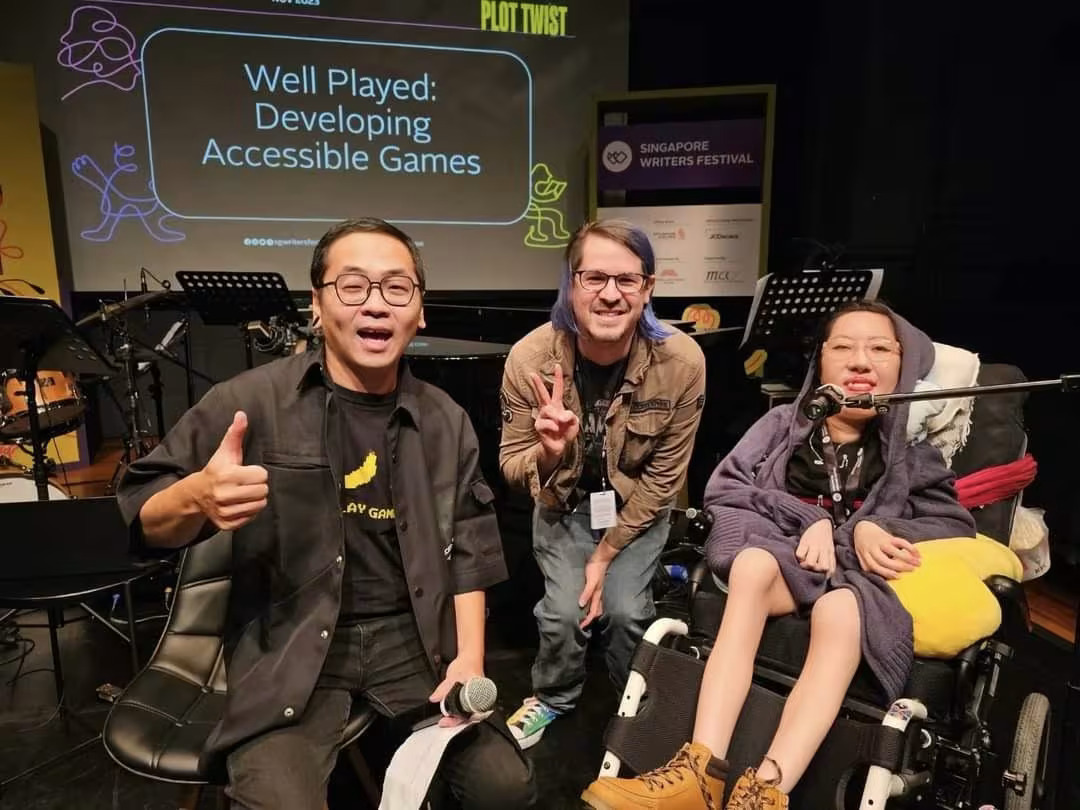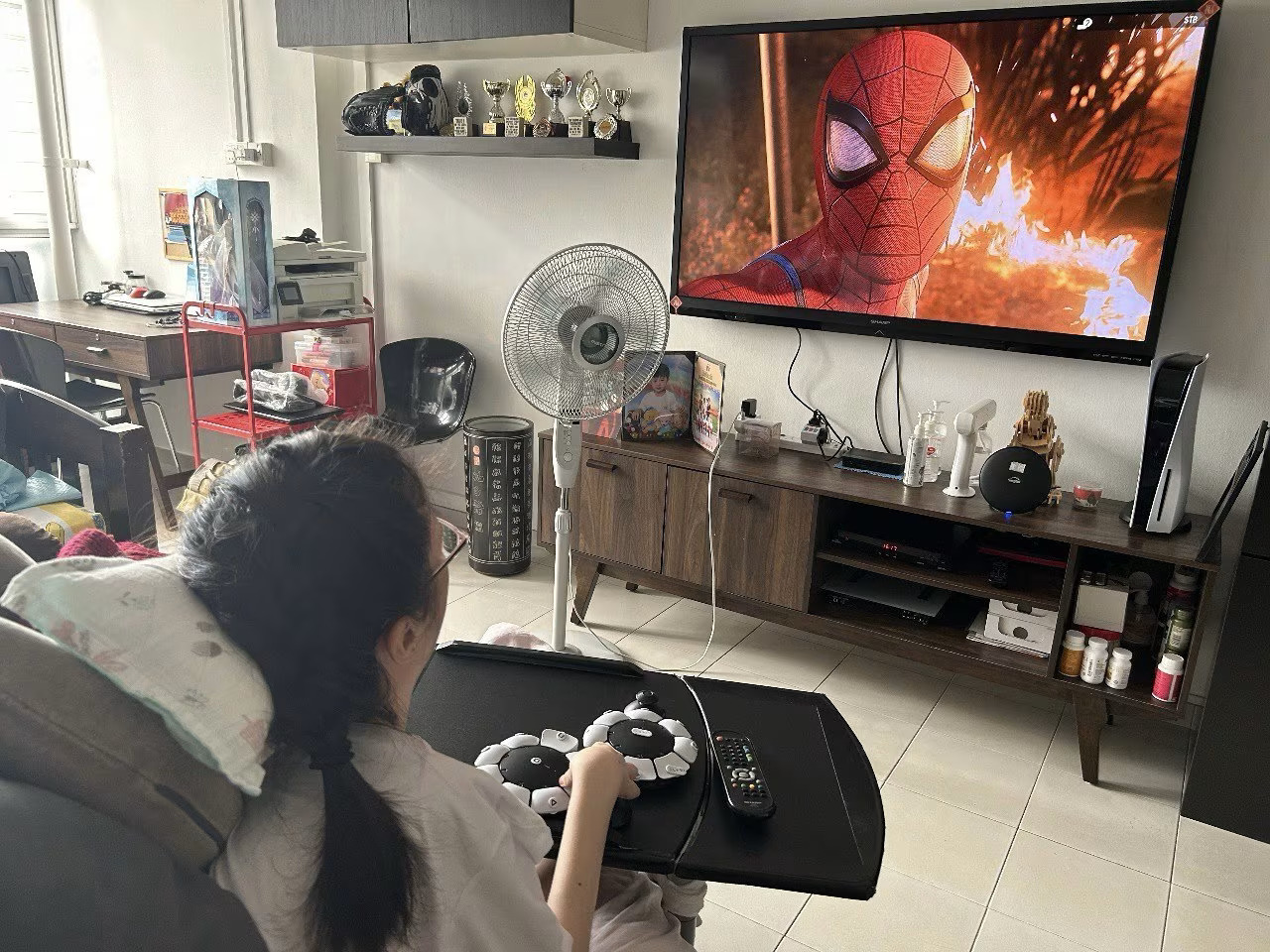CNA – Sherry Toh, a 25-year-old emerging writer, passionate gamer, and advocate for disability rights, has made significant contributions to international gaming platforms, a US-based health publication, and a Singaporean anthology focused on disability and inclusivity.
During a meeting with the source, she sat comfortably on a one-seater sofa in her living room, meticulously propped up by a stack of pillows. This setup is essential because Sherry lives with Spinal Muscular Atrophy (SMA), a rare genetic disorder that affects motor neurons, causing progressive muscle weakness and loss of control.
In Singapore, it affects a small community of 40-50 individuals, as reported by the Singapore Ministry of Health.
Despite her condition, Sherry exuberantly discussed her favourite games and music, particularly Taylor Swift, her fingers adeptly navigating a specially adapted one-handed keyboard.
Her dedication to her passions and advocacy shone through in her conversation, infused with a quiet determination.
It was a small gesture by her foreign domestic helper adjusting her slipping spectacles that underscored the extent of Sherry’s physical limitations.
Unable to lift her own hand to readjust them, Sherry relies on the remaining strength and dexterity in her limbs, neck, and a few fingers on her left hand. Only her right thumb and forefinger retain enough mobility for typing.
Trapped in a body that limits her mobility, Sherry uses her laptop as a gateway to connect with the world through her writing and gaming pursuits.
Her resilience in overcoming physical challenges is a testament to her determination to make an impact despite the barriers she faces.

LIKE BEING STUCK IN COVID-19 FOREVER
Diagnosed when she was 13 months old, Toh never took her first step as a child. She never kicked a ball or rode a bicycle. She was very frail and often hospitalised. “For someone with SMA Type 2, a normal cough could be possibly fatal because our lungs are very weak,” she said.
Toh, who has two younger brothers, was homeschooled for a few years. But her parents, worried that the stress of examinations would be too much for her, got her exempted from PSLE.
She describes her life like the pandemic, drawn out indefinitely. “The isolation, the fear of getting sick, the fear of financials, and the fact that you are missing out on experiences other people have – that’s my life,” she said.
FINDING COMFORT AND CONNECTION IN GAMES
As a child, Toh could still lift her arms and discovered a love for gaming. She began to use the Nintendo Wii video game console to retain muscle strength in her arms.
“There are physical therapists overseas who tell individuals who need to maintain muscle dexterity to pick up a controller and game. It’s recognised as a form of physical therapy,” she explained.
Role-playing games became a form of escape for Toh – a world where she could find her feet and overcome physical limitations.
Some of the games even featured characters with disabilities or chronic pain.
“The game Dragon Age has a character who is missing an eye and a hand. In Cyberpunk 2077, another role-playing game, the main character experiences migraines, nose bleeds and seizures because a faulty microchip went into his head during a heist gone wrong. He spends the entire game trying to find a cure for that,” she said.
Toh relates to these protagonists. She also feels connected to online gaming communities.
“[In the physical world], the first thing anyone notices when they see me is my disability. That’s going to colour the entire conversation going forward. Sometimes, even strangers on the train stare at me for a really long time, like I’m an oddity,” she said.
She added that because SMA is rare, many assume she has a neurological disability, and completely ignore her, talking only to her parents or helper.
The virtual world enables people to see beyond her disability. “When you’re a human being, the thing that you want most out of your relationships is to be seen for who you are,” she said.

DISCOVERING WRITING
It was on Facebook that she met a fellow SMA patient, an American gamer and writer who introduced her to her first paid writing gig at SMA News Today, a US-based digital platform for the SMA community. They accepted her as a regular columnist in 2021.
From there, Toh branched into other writing assignments for gaming publications such as PCGamesN and Uppercut Crit, as well as articles on disability and representation for Rice Media.
“I credit a lot of my writing abilities to listening to Taylor Swift’s music over and over again.
“Swift has taught me the power of storytelling, details, and the way humans can relate to each other through music and events in our lives. One’s story may be specific to them, but the themes of love, bravery, tenacity, heartbrokenness, chaos, and finding meaning are universal,” she said.
Last year, Toh was approached to contribute an essay about gaming accessibility and disability representation for the book Not Without Us: Perspectives on Disability and Inclusion in Singapore.
That same year, she was one of 50 individuals chosen for The Game Awards’ Future Class 2023, which honours individuals around the world who elevate and diversify gaming.
ADVOCATING FOR HER FUTURE
With all that under her belt, you might think Toh’s career is only just beginning. Unfortunately, because SMA is a progressive disease, Toh’s window is simultaneously closing.
“About two to three years ago, my body started to decline very rapidly,” Toh said. She lost the ability to hold her body and neck up, and lost control of her head, which is why she has to be propped up by binders and pillows.
There is oral medication to stop the deterioration and potentially even reverse some of SMA’s effects – risdiplam is the only treatment currently approved by the Health Sciences Authority (HSA) for it. It currently costs SGD375,000 a year.
On June 4, 2024, the Singapore Ministry of Health (MOH) announced that it will be subsidising the use of risdiplam for eligible patients from Aug 1, 2024. Details on the subsidy are not yet available. However, even with subsidies, Toh will still not be able to afford the drug.
Toh currently works six hours a day on weekdays as a virtual assistant for an education institute, checking on contracts, managing inventory and replying to emails. In addition to her freelance writing, she makes slightly more than SGD1,000 a month in total. Her parents support her financially, but they too, live from month to month.
“If I can’t be on this medication, over time, my body functions are going to deteriorate a lot. I have [SMA] friends around the age of 30 who already cannot breathe on their own and have to go out with a ventilator attached to them at all times,” she told the source.
Toh started a crowdfunding page last year, hoping to raise funds for treatment. The campaign will end on June 30 this year.

And at the point of writing, she has raised close to SGD90,000. For her doctor to start treatment, she needs to raise half of the SGD375,000.
Toh fights on, nevertheless. “If you focus on the fact that it can one day, it can all be taken away from you, then you will never get anything done,” she said.
“What I can do is hope for the best. It’s just a matter of whether I can meet the crowdfunding goal and whether our government will one day subsidise the medication.”
Work and gaming keep her going, and this, she said, is made possible by inclusive design such as Sony’s PlayStation Access Controller, which enables her to map the buttons so she can enjoy PlayStation 5 games with one hand.
Toh is currently taking an interactive fiction workshop. Her mentor is Mary Kenney, a writer who created a deaf character in the Marvel’s Spider-Man: Miles Morales game.
Toh is convinced that such diversity brings richness into our physical and virtual worlds, and she hopes to be involved in game development one day.
“Right now, [my favourite Taylor Swift song] is The Manuscript. It’s a song I’ve been turning to as I’m mining my life for an interactive fiction project in the pursuit of becoming a game writer. It reminds me that, even if I can’t necessarily see the point of the pain and trials I’m going through in my present, I may take all of that and spin it into gold one day in my writing,” she said.
It is a powerful dream from a young woman who cannot push up her own spectacles, but who with just two functioning fingers could one day create her own disabled characters on their quest for salvation, healing and hope – allowing the rest of us to walk in the virtual world of a girl who has never walked in real life.





